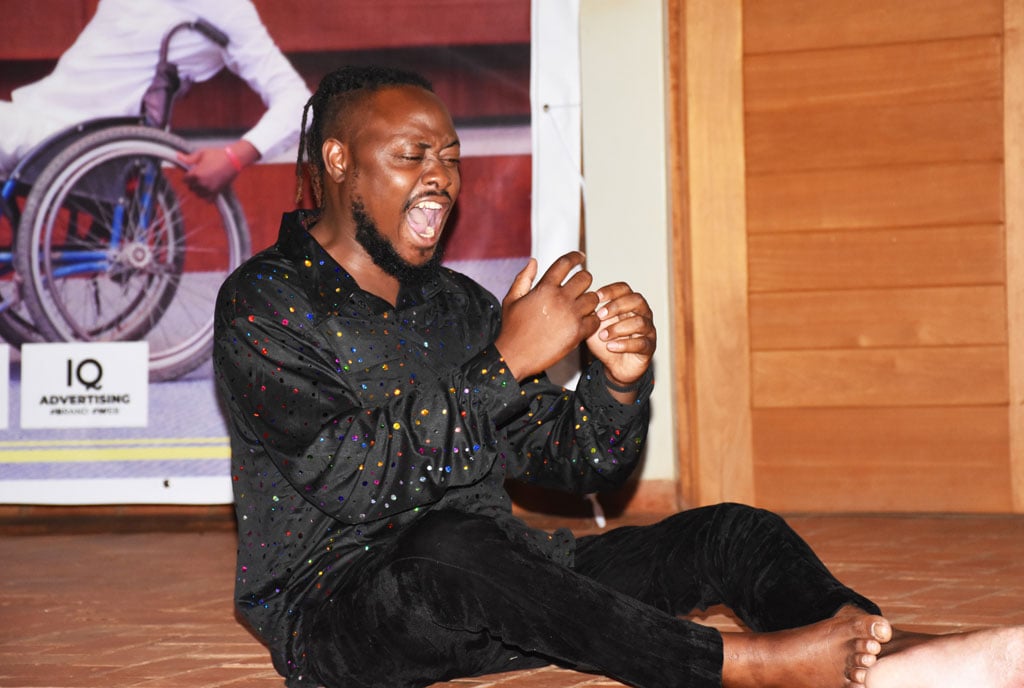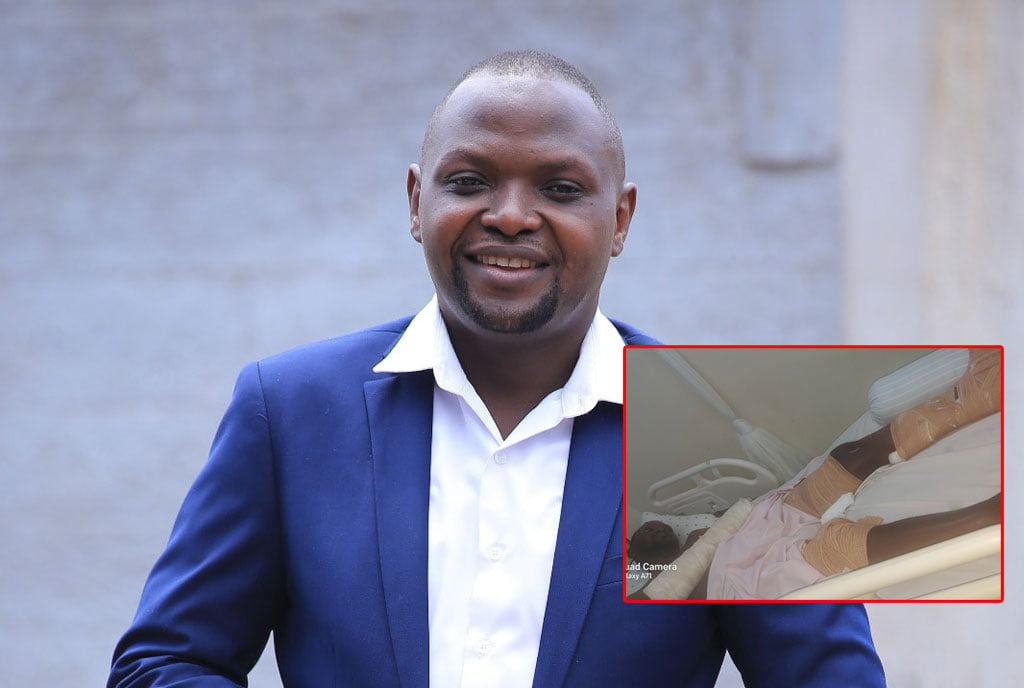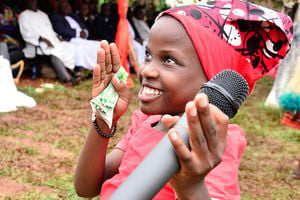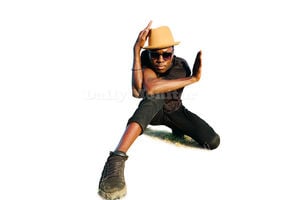
Rogers Bisereko performing. PHOTO/PROMISE TWINAMUKYE
Disability had never even crossed his wild dreams. All his dreams led to one thing… Dance. When a then-unknown disease threatened to stop his dancing career almost forever, he could not take it. Only one thing could surely come out of this - death. But what if it wasn’t?
Rogers Bisereko, ambassador of Kyaninga Mobility Centre started chasing his dance dream from as far as Primary three, when he left his home in Kasese District, planless, for better opportunities in the city - Kampala.
“My young brain knew that when I reached Kampala, I would automatically start dancing with renowned people,” Bisereko says.
With the Shs5,000 his father had left on the table for lunch, Bisereko boarded a Pokopoko bus that brought him to Kampala.
He took to the streets and sold empty plastic bottles to survive. He would dance in competitions here and there, danced in different music videos such as Sitaani tonkema remix and Nkwaatako where Sheebah featured. Years later, when he finally joined Trojan, a dance group that would be his last.
‘My last dance’
A few days to opening Club Tavern Kicks, Masaka in July 2017, Bisereko developed persistent back pain that painkillers failed to relieve. He thought it may just have come from the fatigue of the dance moves they usually did. On the way to the opening, when he could not even eat his favourite roadside chicken, his crew knew then that he was sick.
“Even in pain, I wanted to give it my all, like it would be my last. We gave our 15-minute performance and the crowd was ululating when we left the stage,” he recounts.
By the time they were back in Kampala, his left leg was paralysed. He still did not take it seriously until the next day when he could not move it.
His friend and roommate Ali brought a nurse who took his vitals such as running tests on his blood pressure and HIV, but the results turned out negative.
The following day, another leg followed suit. He called his mother, who first brushed it off thinking he was joking and sent his sister to confirm. She sent him money to go home.
“The day before I travelled, we had visitors at home. I needed to go for a short call and since I could not walk, I decided to crawl and use a bucket. The next thing I heard was the girls saying: ‘Rogers, you have peed on yourself’. I could no longer control my body system. I looked at myself and my pants were drenched. I was so embarrassed. I wanted to leave for Kasese at once,” he shares.
By the time he reached home, the numbness had reached his lower abdomen. His mother took him for an X-ray at Kilembe Mines Hospital, but the results did not present anything life-threatening.
Myths about the illness
“When we told my sister, her first thought was witchcraft. Myths started pouring in,” he says.
They went from one witch doctor to another. The first one told them Bisereko’s uncle had bewitched him over land wrangles, and that they would need to buy a sheep as a sacrifice and he would be up and moving again.
He spent three weeks at the witch doctor’s shrine, bedridden. By the time they left, he had developed bed wounds due to insufficient care. He had not even used the toilet in that time since the witch doctor gave them plain cassava to eat throughout their stay there.

Rogers Bisereko with his mother in Lubowa off Entebbe Road. PHOTO/PROMISE TWINAMUKYE.
Bisereko was told that his uncle had used witchcraft to block his intestines and that he would need an operation.
He tried four more witch doctors until he was taken to church, all the time enduring pain and discomfort.
“I realised that my mother had given up on me. They had told her that I was going to die and she thought I might as well die in church. The religious leaders had told her that I joined the Illuminati based on my dance crew name Trojan, apparently a name in Greek mythology meaning something sinister,” he says.
His tattoos were also linked to that, making his mother believe that he was suffering because the cult asked him to sacrifice her and he refused. The numbness had reached his ribs at the moment.
Ali, his crew member had come to check on him and had brought adult diapers when he decided Bisereko needed serious medical attention. He forcefully took him back to the city.
His crew looked for more money to do an MRI scan, which also showed nothing.
Name of the problem
It was not until towards the end of the year that they got money for a CT scan at Case Hospital that something tangible was recognised. The results showed that he had transverse myelitis.
This, according to hopkinsmedicine, is an inflammation of part of the spinal cord. The exact cause is often not known, but it sometimes happens after infections or in people with autoimmune diseases. Common symptoms are back or neck pain, weakness or sensation changes in the arms or legs, or loss of bladder or bowel control.
He was referred to the Dr Edward Ddumba (RIP), a neurosurgeon in Nsambya Hospital.
“I spent two weeks at the hospital. We were paying Shs200,000 every day at the hospital. I went back to Kyengera, where I was staying. Ali had stopped work to take care of me,” he recalls.
The pain had gone but the legs remained numb. He would be using his wheelchair for a long time.
Optimism
His wounds had started to heal and now pastors were suggested. The exhilaration he had with the hope that he would come back running wore out after going to more than five famous pastors. He descended into despair.
“I started asking God why me. I had taken medicine and my sweat reeked of it. I had started looking like a drug addict with my arm turning black because of injections. ‘Why did God decide to interfere with my dreams?’ he would rhetorically talk to himself.
His first wheelchair
When he got his first wheelchair, he took to alcohol. ‘Friends’ were quick to spoil him with the bitter drink. With alcohol on the brain, he insulted anyone that ever cared for him, especially his close friend Ali.

Rogers Bisereko with a dancer during his Coming Back to Dance at the British Council. PHOTO/PROMISE TWINAMUKYE
When Covid-19 hit, Bisereko had already left Ali for people who would give him alcohol. With nowhere to get money from, they started using him to get money, to the point of announcing his death to his mother.
He realised he had no genuine friends and the few he had, he had chased them away. He headed back to Kasese, fully functioning in a wheelchair.
“I slowly stopped feeling sorry for myself and started looking for videos of people dancing in a wheelchair to get inspiration. I started training my upper body to make some dance moves and found ways to make the moves with my wheelchair,” he says.
He also started watching inspirational movies to give him hope for the future.
During that time, 2021, Richard Kabenge, commonly known as Valentino, called him and asked if he could still dance. He wanted him to feature in his event called DanceWithValentino Experience at Kampala Serena Hotel. He took up the opportunity.
Turning point
“Two weeks later, he came to get me. I could not believe he would come for me. He took me to his studio and gave me a choreographer called Daphne Tumwebaze to guide me,” he says.
By the fourth day, with Tumwebaze’s help, Bisereko was ready for the DancewithValentino experience.
“When we were done, I felt something I missed for a while. I felt uniquely happy. The experience was exhilarating. People this time came to tell me how happy and inspired they were. I can still remember the standing ovation I got after my dance. I slowly started to think that God had His reasons,” he says.
Valentino believed that Bisereko could do more even in a wheelchair. That motivated him. Through ValRich Arts, a company Valentino co-founded with Zena Bernacca, he got a therapist to help him build his confidence and create a formal way to talk to people in English (having dropped out of school in Primary Three, He could not articulate himself well in English).

Bisereko(on wheelchair) in a dance episode with his former crew and other dancers in 2023 at the British Council, Kampala. PHOTO/PROMISE TWINAMUKYE.
Taking dance seriously, he needed a chair meant for that and it was about $5,000 (approximately Shs18.5m) in the US.
ValRich Arts connected him to Kyaninga Mobility Centre, which was doing experiments on mobility wheelchairs and he started to experiment with every prototype.
He later became their ambassador and the living testimony that disability is not inability.
He also reached out to his friends, and they forgave him.




